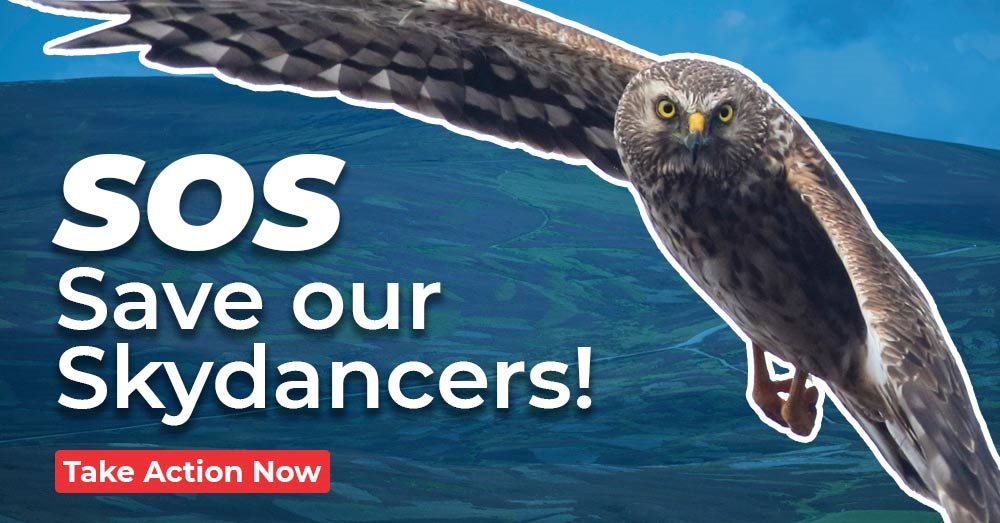
Over 57,000 e-actions have been taken since Hen Harrier Day, pressing elected politicians to act on wildlife crime and generally on the ecological problems associated with driven grouse shooting. Thank you – it’s an amazing response and I’m sure it has quite a way to go still.
Below I have posted the standard response from Labour MSPs – it’s pretty good and demonstrates engagement with the issue, with the parliamentary process and with the constituent. I’ll post the equivalent from Scottish Conservative MSPs later today.
This response shows that Labour in Scotland is fuilly behind a licensing scheme for grouse shooting.
If you have already contacted your elected politician – thank you! You are one of over 57,000 who have done so.
But if you want to give your elected politician a nudge to act for change then please send them a message through this e-action which is a joint campaign by the RSPB, Hen Harrier Action and Wild Justice. Click here to have a look please. Thank you!
Here is the standard response from Labour MSPs:
Thank you for your email highlighting your serious concerns about the decline in hen harrier populations and about driven grouse moors.
I recognise your specific concerns about hen harriers and would widen this out to the persecution of other birds of prey as well. Scottish Labour finds the attacks which continue to occur abhorrent.
My colleague Alex Rowley MSP has recently lodged a Scottish Parliament motion for debate which focusses on your concerns and you can view it here.
Last year Claudia Beamish MSP, Scottish Labour spokesperson for Animal Welfare, Environment, Climate Change and Land Reform attended the Scottish Raptor Study Group Conference to show support and to learn more about the persecution of birds of prey and how to address it.
As you will know the new Animals and Wildlife (Penalties, Protections and Powers) (Scotland) Act creates new categories of serious crime which will enable unlimited fines and up to 5 years imprisonment.
The new Act recognises the seriousness of wildlife and animal cruelty crimes and I hope this will act as a further deterrent. I also hope that this will also make the use of police time on such alleged offences more focused. These crimes often happen in remote rural locations and perpetrators must not be allowed to think they can act with impunity. The support of many charities and voluntary groups in monitoring birds of prey makes a significant contribution to better protection.
Claudia Beamish MSP and Colin Smyth MSP had a range of amendments to the new Act to strengthen it. Claudia was able to ensure that the destruction of nesting and resting places of birds of prey was shifted to the serious crimes schedule. Such damage can risk fatality as much as a direct attack. Use of illegal pesticides was moved to the serious crime category due to the acceptance of my amendment to the bill. As you will know birds of prey are at risk of poisoning and I hope this will be a further deterrent to their use.
I was relieved that at least illegal traps and snares have been added to the list of vicarious liability crimes.
It is disappointing, however, that other crimes against wildlife were not accepted by the Scottish Government in the Vicarious Liability category.
In relation to driven grouse moors, Scottish Labour called for a robust licencing system with criteria well before the publication of the Werritty Report.
These criteria include –
· Taking meaningful action to end the illegal shooting of raptors
· Taking a robust position on all wildlife persecution.
· Outlawing the use of all types of snares
· Outlawing mass mountain hare culls
· Preventing road hill tracks from being built without planning permission
· Banning the use of lead shot
In addition –
Calling on the Scottish Government to review burning on deep peat and consider the possibility of a ban with the appropriate exemptions as one of a range of options– in view of the climate emergency.
Introducing a general presumption against burning on driven grouse moors
Restricting the use of medicated grit on grouse moors, assess its strength and urgently commission research into its effects on biodiversity, ecosystems and human health
I am also clear that 5 years is not an acceptable probationary period to wait. These should be consulted on and implemented immediately. The monoculture often created by driven grouse moors is not acceptable in the public interest and for the future of our upland economies. I agree with you that “changes will deliver enormous benefits to our birds, our landscapes and our people and positive steps towards tackling the climate and biodiversity crisis.”
Scottish Labour will work to ensure this happens.
Thank you for contacting me on this important issue.
[registration_form]
Yes Labour’s response is really good in my opinion and “ on the ball”. What a difference between them and the awful Tory responses. Now it is down to the SNP to hopefully take a similar line to Labour and to initiate legislation in the Scottish Parliament. The SNP (most of their MSPs) , Labour and the Green member should have sufficient votes for a majority to enable legislation to be passed.